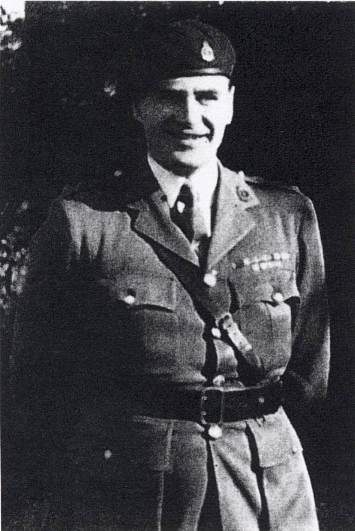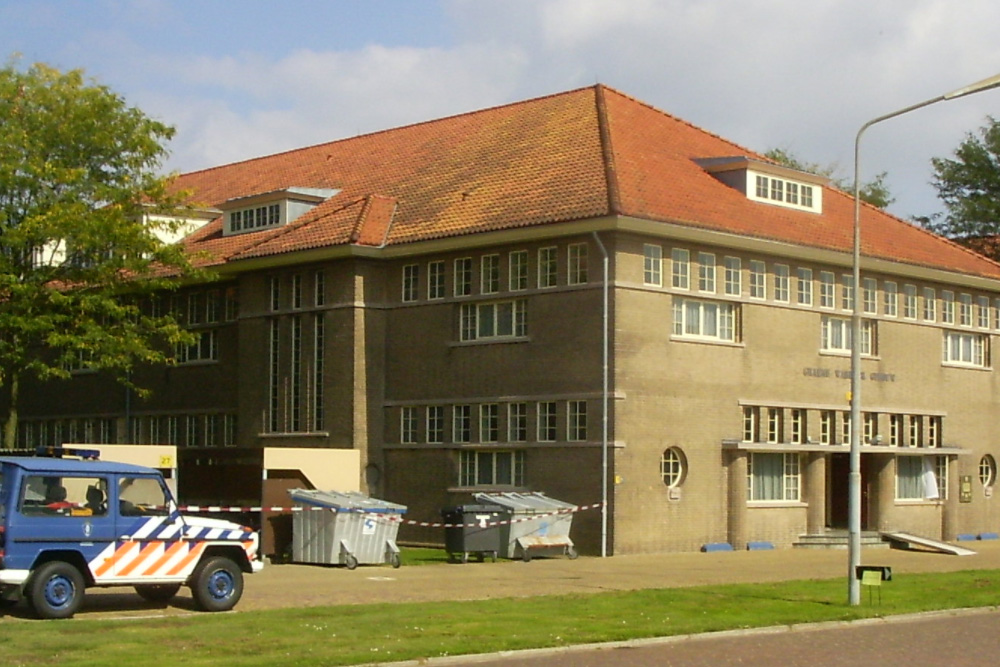Warrack, Graeme Matthew
- Date of birth:
- June 27th, 1913 (Edinburgh, Scotland)
- Date of death:
- January 13th, 1985 (Humbie, Scotland)
- Service number:
- P/57723
- Nationality:
- British (1801-present, Kingdom)
Biography
Do you have more information about this person? Inform us!
- Period:
- Second World War (1939-1945)
- Rank:
- Acting Colonel
- Unit:
- ADMS, Headquarters, 1st Airborne Division, British Army
- Awarded on:
- May 24th, 1945
- Awarded for:
- Operation Market Garden
"At ARNHEM this officer was ADMS of the Division. On 20th September the Dressing Station, which he had organised, became involved in the fighting area and eventually fell into German hands. The battle continued to rage on either side of the buildings used until the final evacuation of our own troops.
During this time the treatment of casualties became increasingly difficult. There were large numbers to be dealt with and the area was at time under fire from both sides. The firm attitude adopted by Colonel WARRACK towards the Germans and his insistence that our casualties and the medical personnel received proper treatment was instrumental in saving many lives.
There was considerable shortage of food and water in the hospital and Colonel WARRACK after interview with the German Commander managed to arrange for our jeeps, during the battle, to draw water from German held sources. In spite of the constant shelling and mortaring he many times passed to and fro from the hospital through the German positions to the Divisional HQ and kept both places informed of the general situation.
After the withdrawal of our forces south of the Rhine, Colonel WARRACK was put in charge of the hospital at Apeldoorn which was receiving our casualties from Arnhem. The initiative and organising ability shown by him was quite first class. By his tactful handling of the German authorities, and his insistence of the terms of the Geneva Convention, he was able to arrange that the treatment in the hospital and the subsequent evacuations were carried out as comfortably as possible.
When the final evacuation to German was ordered, Colonel WARRACK arranged for the necessary doctors and medical orderlies to accompany the parties of casualties, then he himself by various means managed to hide from the German authorities and eventually to escape into Dutch hands.
He remained in hiding for a period until the necessary arrangements could be made for him to be passed over the River Rhine and rejoin our own troops.
The initiative displayed by this officer at all times and the courage with which he carried out his task is worthy of the highest praise."
- Period:
- Second World War (1939-1945)
- Rank:
- Major-General
- Unit:
- ADMS, Headquarters, 1st Airborne Division, British Army
- Awarded on:
- September 20th, 1945
- Awarded for:
- Operation Market Garden
Citation:
"Colonel Warrack, after remaining behind to care for the wounded at Osterbeek, was taken prisoner on 26th September 1944, and was the same day transferred to Apeldoorn. As senior medical officer he did everything possible to ameliorate the conditions of the Prisoners of War, and to assist escapers. At the same time he planned his own escape, which he proposed to put into effect immediately prior to the closing of the hospital. During the confusion of the main evacuation of Prisoners of War on 18th October 1944, he climbed into a previous prepared hideout, a hollow space 10 feet x 3 feet x 18 inches, situated above two cupboards in his own room.
A small section of the medical staff were allowed to remain in the hospital for a further 4 days, and at Colonel Warrack's suggestion, his room was used as the Dental Centre. He was thus able to leave his hideout for a few hours each evening until the departure of the rear party on 26th October 1944.
Whilst the Germans were removing all equipment, Colonel Warrack had to remain hidden for a continuous stretch of 48 hours. When he emerged to explore the possibilities of leaving the building he was seen from outside, and, unable to reach his room before the search party arrived, he hid under a bed in one of the wards. He was not discovered and was able to return to the cupboard. Except for half an hour each day, he stayed there until all sounds of activity had ceased on 1st November 1944.
Before he could effect his escape, the building was occupied as a barracks, the Commanding Officer of this unit acquiring the room in which Colonel Warrack was hidden. It was not until the evening of 3rd November 1944 that he was able to move from the cupboard. Although the moon was full and there was a guard on duty below, Colonel Warrack climbed out of the window and crawling beside the perimeter fence, found a break in the wire. He made his way South West until he was driven by thirst to approach an isolated house near Otterloo. Help was offered immediately. On 18th November 1944 Colonel Warrack was a member of a large party of Allied personnel who were dispersed when being guided through the German lines. Although he and three others tried to complete the journey alone, ultimately they were compelled to retrace their steps to Otterloo. A month later Colonel Warrack was taken to Barneveld.
About the middle of January a second attempt to cross the lines was begun; when this had to be abandoned because of the ice-bound rivers, the small party was hidden in the Maarn area. Colonel Warrack participated in yet a third unsuccessful scheme before he finally reached safety on 5th February 1945."
"Colonel Warrack, after remaining behind to care for the wounded at Osterbeek, was taken prisoner on 26th September 1944, and was the same day transferred to Apeldoorn. As senior medical officer he did everything possible to ameliorate the conditions of the Prisoners of War, and to assist escapers. At the same time he planned his own escape, which he proposed to put into effect immediately prior to the closing of the hospital. During the confusion of the main evacuation of Prisoners of War on 18th October 1944, he climbed into a previous prepared hideout, a hollow space 10 feet x 3 feet x 18 inches, situated above two cupboards in his own room.
A small section of the medical staff were allowed to remain in the hospital for a further 4 days, and at Colonel Warrack's suggestion, his room was used as the Dental Centre. He was thus able to leave his hideout for a few hours each evening until the departure of the rear party on 26th October 1944.
Whilst the Germans were removing all equipment, Colonel Warrack had to remain hidden for a continuous stretch of 48 hours. When he emerged to explore the possibilities of leaving the building he was seen from outside, and, unable to reach his room before the search party arrived, he hid under a bed in one of the wards. He was not discovered and was able to return to the cupboard. Except for half an hour each day, he stayed there until all sounds of activity had ceased on 1st November 1944.
Before he could effect his escape, the building was occupied as a barracks, the Commanding Officer of this unit acquiring the room in which Colonel Warrack was hidden. It was not until the evening of 3rd November 1944 that he was able to move from the cupboard. Although the moon was full and there was a guard on duty below, Colonel Warrack climbed out of the window and crawling beside the perimeter fence, found a break in the wire. He made his way South West until he was driven by thirst to approach an isolated house near Otterloo. Help was offered immediately. On 18th November 1944 Colonel Warrack was a member of a large party of Allied personnel who were dispersed when being guided through the German lines. Although he and three others tried to complete the journey alone, ultimately they were compelled to retrace their steps to Otterloo. A month later Colonel Warrack was taken to Barneveld.
About the middle of January a second attempt to cross the lines was begun; when this had to be abandoned because of the ice-bound rivers, the small party was hidden in the Maarn area. Colonel Warrack participated in yet a third unsuccessful scheme before he finally reached safety on 5th February 1945."
Sources
- Photo 1: Pegasus Archive
- - Supplement to The London Gaette Issue 37091 published on the 22 May 1945
- Supplement to The London Gazette Issue 37274 published on the 18 September 1945
- The Battle of Arnhem Archive
- The Pegasus Archive
- Recommendation for Award for Warrack, Graeme Matthew Rank: Colonel Service... | The National Archives






